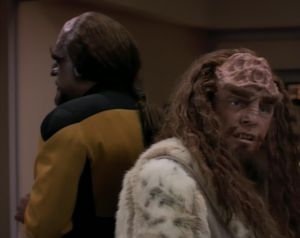| |||||||||||
| |||||||||||
|
Spoiler-free notes: I'm glad the writers are addressing the loose ends left over from "Birthright, Part II." Apparently, Starfleet instilled in Worf an appropriate amount of scientific skepticism, even in the face of something he wants to believe. A very different version of Kahless appears in TOS' "The Savage Curtain." Apparently, the writers explain the contradiction by explaining that the TOS Kahless was a reacreation of human impressions of the figure, whereas the Kahless in "Rightful Heir" is more in-line with how Klingons see him. Gowron still relies on Picard for his impartiality, proving that he has not forgotten the role the captain played in facilitating Gowron's ascendancy. For plot reasons, I understand why Picard refuses to contemplate whether Kahless is real or not, but given how strongly he reacted to the apparent arrival of a diety in "Devil's Due," it seems a little out of character. Gowron comes across as paranoid and desperately clutching to his power--so it's easy to dismiss his conclusions because of his obvious vested interests--but he's actually right about "Kahless" and Koroth. Good dramatic irony. The existential identity crisis the Kahless clone goes through when he learns what he really is has to be pretty friggin intense. It's amazing he's able to cope with it at all. How many times is the fate of the entire Klingon Empire going to fall on Worf's shoulders? When Data asks him whether this experience has deepened the spiritual crisis Worf is in or whether he believes Kahless will still return someday, Worf answers "I do not know." He's still a scientist, and that's gratifying for an episode that takes Worf through an extremely dynamic journey from doubt to belief and back to doubt again. Data's monologue that follows, in which he talks about his beliefs about his own nature, is pretty profound stuff. This episode is a meditation on the nature of faith and the importance of skepticism, but it keeps its message from spiraling out of control in one direction or the other; it remains reasonable, moderate, and agnostic. With its heavy religious overtones, it is doubtful that Roddenberry would have allowed this episode, but that just goes to prove that Star Trek has grown beyond the visions of one man. This feels way more like an episode of DS9 than TNG, which is probably due to the fact that the teleplay was written by Ronald Moore, who would later become heavily involved in DS9 (and the remake of Battlestar Galactica several years after that). | |||||||||||
|
| |||||||||||
| |||||||||||
|
Copyright ©2012 e. magill. All rights reserved.
|

